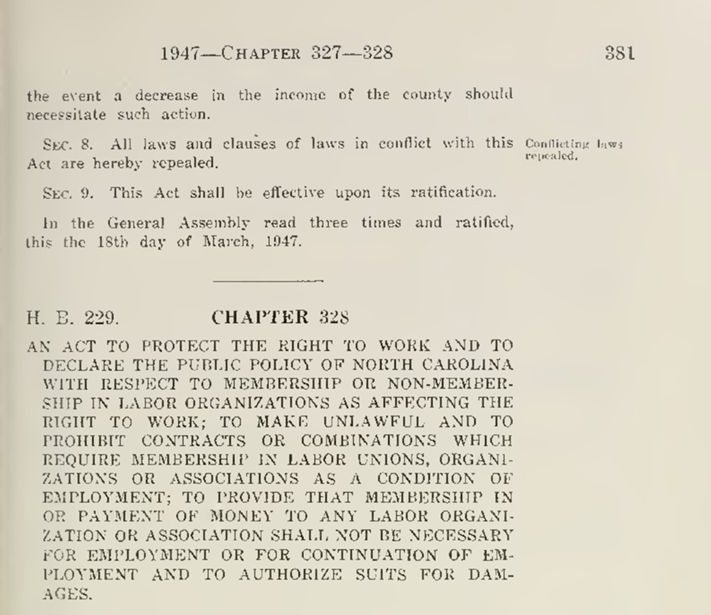North Carolina on Friday, March 18, will celebrate the 75th anniversary of its Right to Work law.

The purpose and meaning of Right to Work are explained in a new report, “Pro-Worker, Pro-Growth Making Right-to-Work Permanent in North Carolina,” by F. Vincent Vernuccio and available on the website of the John Locke Foundation, which commissioned the study. Vernuccio is strategic adviser for the Mackinac Center and Workers for Opportunity and president of the Institute for the American Worker.
“It’s a huge milestone. It’s something to be incredibly proud of,” Vernuccio said of the anniversary. He and George Leef, director of editorial content for the James G. Martin Center for Academic Renewal, shared their thoughts on worker freedom during a meeting of the Shaftesbury Society, sponsored by the John Locke Foundation, on Monday, March 14.
Locke President Donald Bryson, a vocal supporter of Right to Work, hosted the discussion.

The Right to Work law, approved in 1947, outlawed requiring union membership as a condition of hiring or of continued employment. It bans the idea of a “closed shop,” in which union membership is a necessary part of getting and keeping a job. The law also bans a “union shop.” In that scenario, an employer can hire nonunion workers, as long as those workers join the union within a certain period. The law also prohibits the mandatory collection of union dues by employers through payroll deductions.
Twenty-seven states have Right to Work laws, which don’t affect collective bargaining, Vernuccio said. “It’s simply about one thing, and that’s freedom. Right to Work is simply pro-worker.”
Leaf traced the history of Right to Work to FDR’s New Deal and the National Labor Relations Act, which federalized labor relations, thus making unions an essential part of “big labor,” Leef said.
Unions, once certified, are cemented in place, Leef said, consequently leading to an expansion of union power and the subsequent strikes and other labor turmoil. The federal Taft-Hartley Act, approved by Congress in June 1947, helped to ensure, however, that North Carolina’s labor policy could prevail even if federal policies tilted more toward a pro-union stance.
Unions, Leef and Vernuccio agreed, can, theoretically, be a force for good, although the groups are generally stuck in the past, circa 1930 or so. Unions, in general, refuse to engage in competition or to find better ways to represent American workers, Leaf said.
They operate through coercion in collecting dues, in turn padding the pockets of union leaders and supporting political policies or causes with which members may not agree.
“All freedoms that Americans take for granted … are taken away when it comes to unions. They have to find ways to satisfy consumers at an individual level,” Leef said.
“The crucial element here is individual freedom. Allowing workers the freedom to drop out allows for more responsible unions.”
Right to Work offers workers an escape hatch,” Leef said. “It gives those people the right to say, ‘I don’t want you to use my money that way.’”
The union model is broken, Vernuccio said, as an industrial revolution, one-size-fits-all mentality permeates most labor groups today.
“A majority of states currently protect worker freedom, with nine of those states enshrining their law in their constitution,” Vernuccio writes in the report. “North Carolina should become the 10th. The right to work free from being compelled to join or otherwise pay fees to a union is a critical component of a free society. Labor unions have no justification infringing on a worker’s agreement with an employer with demands to submit a portion of one’s salary to the union’s coffers.”
A bill introduced in the General Assembly last April, Senate Bill 624, would amend the N.C. Constitution to guarantee a person’s right to work, free from union coercion. It passed the first reading but has sat in the Rules and Operations Committee since.
A constitutional amendment, Bryson has said, would be much more difficult to repeal, as compared to the law.
While Vernuccio thinks it imperative to solidify the right to work in the N.C. Constitution, thus ensuring worker freedom is safe for years to come, Leef is reticent toward pushing an amendment. Leef, though a staunch proponent of workers’ rights, says placing a proposed amendment on election ballots would result in unions spending a lot of money to fight the move, as well as spawning disinformation campaigns.
“It might be better to let the sleeping dog lie rather than invite that battle,” Leef said.” I’m not sure that this is tactically the way to go.
“We need to be careful on this.”
“When you look at polling,” Vernuccio said, “Right-to-Work is incredibly popular. Polling is off the charts in favor of Right to Work.”
In a Locke poll of likely 2022 general election voters one year ago, the vast majority of respondents supported the state’s right-to-work law and would support a Right to Work amendment to the N.C. Constitution.
Public opinion and analytics firm Cygnal conducted a study of 600 voters on a number of issues, including Right to Work. Seventy-one percent of respondents say they support an amendment, while just 13% would oppose it. Slightly more than half said they strongly support a Right to Work amendment.
A perfect, though unlikely scenario, involves repealing the NLRA and leaving decisions about unions to the states, Leef said.
Allow workers to cut their own deals, the experts said. Remodel unions toward a voluntary system, removing the monopolies and the coercion, more like professional service or training organizations.
On Tuesday,, Tennessee Gov. Bill Lee announced the week of March 6 as “Right to Work Week.” Lee, writes the National Federal of Independent Business, encouraged Tennesseans to support the ongoing Yes on 1 effort, which would enshrine Right to Work in the Tennessee Constitution.
“States around the country are embracing worker freedom,” Vernuccio said.
“Research continues to indicate that Right to Work states not only create more jobs than their counterparts, but workers in those states report higher life satisfaction,” Bryson has said. “North Carolina is on the verge of its diamond anniversary of seeing these benefits.”